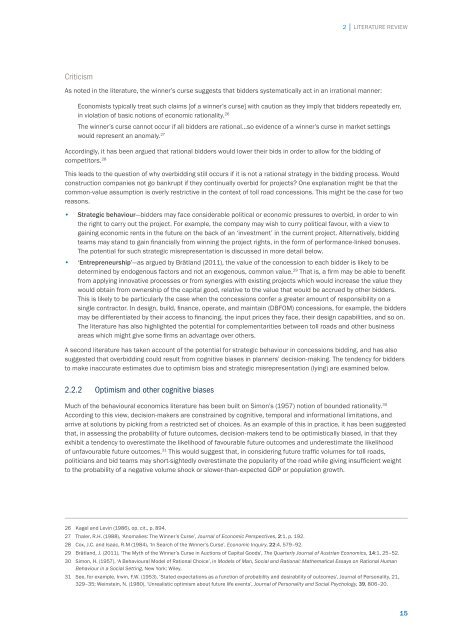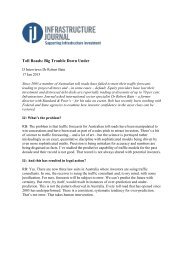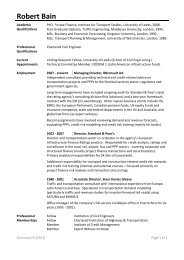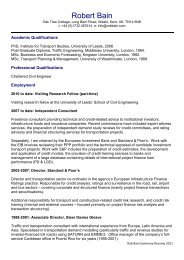Disincentivising overbidding for toll road concessions
Disincentivising overbidding for toll road concessions
Disincentivising overbidding for toll road concessions
- No tags were found...
You also want an ePaper? Increase the reach of your titles
YUMPU automatically turns print PDFs into web optimized ePapers that Google loves.
2 │ LITERATURE REVIEW<br />
Criticism<br />
As noted in the literature, the winner’s curse suggests that bidders systematically act in an irrational manner:<br />
Economists typically treat such claims [of a winner’s curse] with caution as they imply that bidders repeatedly err,<br />
in violation of basic notions of economic rationality. 26<br />
The winner’s curse cannot occur if all bidders are rational...so evidence of a winner’s curse in market settings<br />
would represent an anomaly. 27<br />
Accordingly, it has been argued that rational bidders would lower their bids in order to allow <strong>for</strong> the bidding of<br />
competitors. 28<br />
This leads to the question of why <strong>overbidding</strong> still occurs if it is not a rational strategy in the bidding process. Would<br />
construction companies not go bankrupt if they continually overbid <strong>for</strong> projects One explanation might be that the<br />
common-value assumption is overly restrictive in the context of <strong>toll</strong> <strong>road</strong> <strong>concessions</strong>. This might be the case <strong>for</strong> two<br />
reasons.<br />
••<br />
Strategic behaviour—bidders may face considerable political or economic pressures to overbid, in order to win<br />
the right to carry out the project. For example, the company may wish to curry political favour, with a view to<br />
gaining economic rents in the future on the back of an ‘investment’ in the current project. Alternatively, bidding<br />
teams may stand to gain financially from winning the project rights, in the <strong>for</strong>m of per<strong>for</strong>mance-linked bonuses.<br />
The potential <strong>for</strong> such strategic misrepresentation is discussed in more detail below.<br />
••<br />
‘Entrepreneurship’—as argued by Brätland (2011), the value of the concession to each bidder is likely to be<br />
determined by endogenous factors and not an exogenous, common value. 29 That is, a firm may be able to benefit<br />
from applying innovative processes or from synergies with existing projects which would increase the value they<br />
would obtain from ownership of the capital good, relative to the value that would be accrued by other bidders.<br />
This is likely to be particularly the case when the <strong>concessions</strong> confer a greater amount of responsibility on a<br />
single contractor. In design, build, finance, operate, and maintain (DBFOM) <strong>concessions</strong>, <strong>for</strong> example, the bidders<br />
may be differentiated by their access to financing, the input prices they face, their design capabilities, and so on.<br />
The literature has also highlighted the potential <strong>for</strong> complementarities between <strong>toll</strong> <strong>road</strong>s and other business<br />
areas which might give some firms an advantage over others.<br />
A second literature has taken account of the potential <strong>for</strong> strategic behaviour in <strong>concessions</strong> bidding, and has also<br />
suggested that <strong>overbidding</strong> could result from cognitive biases in planners’ decision-making. The tendency <strong>for</strong> bidders<br />
to make inaccurate estimates due to optimism bias and strategic misrepresentation (lying) are examined below.<br />
2.2.2 Optimism and other cognitive biases<br />
Much of the behavioural economics literature has been built on Simon’s (1957) notion of bounded rationality. 30<br />
According to this view, decision-makers are constrained by cognitive, temporal and in<strong>for</strong>mational limitations, and<br />
arrive at solutions by picking from a restricted set of choices. As an example of this in practice, it has been suggested<br />
that, in assessing the probability of future outcomes, decision-makers tend to be optimistically biased, in that they<br />
exhibit a tendency to overestimate the likelihood of favourable future outcomes and underestimate the likelihood<br />
of unfavourable future outcomes. 31 This would suggest that, in considering future traffic volumes <strong>for</strong> <strong>toll</strong> <strong>road</strong>s,<br />
politicians and bid teams may short-sightedly overestimate the popularity of the <strong>road</strong> while giving insufficient weight<br />
to the probability of a negative volume shock or slower-than-expected GDP or population growth.<br />
26 Kagel and Levin (1986), op. cit., p. 894.<br />
27 Thaler, R.H. (1988), ‘Anomalies: The Winner’s Curse’, Journal of Economic Perspectives, 2:1, p. 192.<br />
28 Cox, J.C. and Isaac, R.M (1984), ‘In Search of the Winner’s Curse’, Economic Inquiry, 22:4, 579–92.<br />
29 Brätland, J. (2011), ‘The Myth of the Winner’s Curse in Auctions of Capital Goods’, The Quarterly Journal of Austrian Economics, 14:1, 25–52.<br />
30 Simon, H. (1957), ‘A Behavioural Model of Rational Choice’, in Models of Man, Social and Rational: Mathematical Essays on Rational Human<br />
Behaviour in a Social Setting, New York: Wiley.<br />
31 See, <strong>for</strong> example, Irwin, F.W. (1953), ‘Stated expectations as a function of probability and desirability of outcomes’, Journal of Personality, 21,<br />
329–35; Weinstein, N. (1980), ‘Unrealistic optimism about future life events’, Journal of Personality and Social Psychology, 39, 806–20.<br />
15






